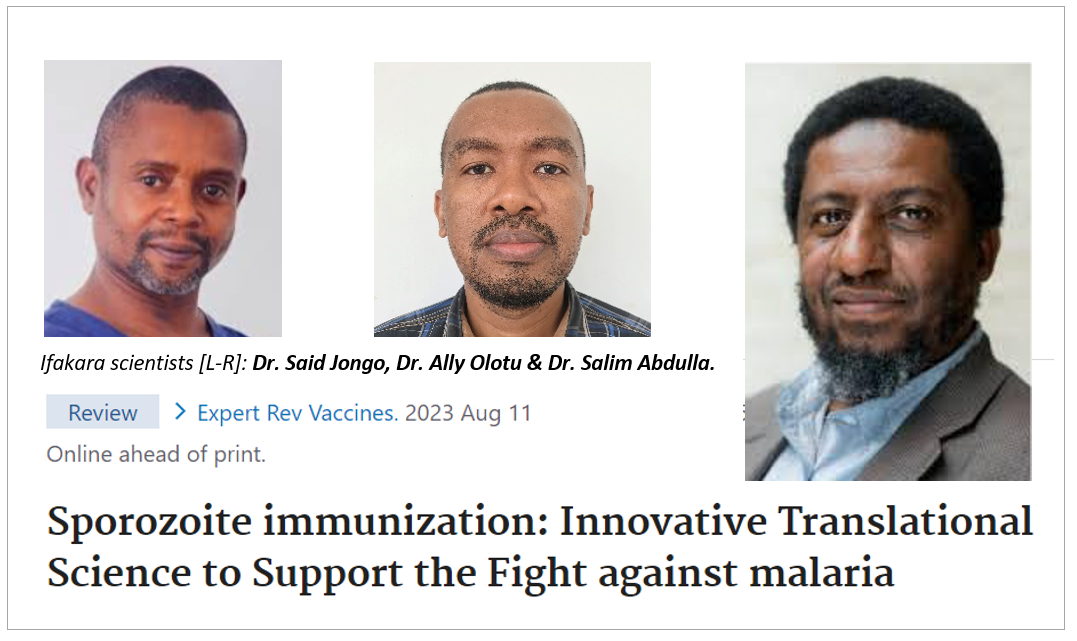
REVIEW: Scientists share the timeline for a new malaria vaccine

Ifakara Health Institute scientists have contributed to the publication of a review that provides a timeline of the malaria vaccine, “PfSPZ” development activities. The vaccine has been confirmed in several clinical trials to be safe, extremely well tolerated and highly efficient.
The review, which was written in collaboration with 42 other colleagues from partner institutions, including the PfSPZ vaccine's developers - Sanaria, provides a historical account, outlining the goals, accomplishments, and progress made thus far as well as the challenges that must be overcome in order to get the vaccine approved and put into use.
Over 30 clinical trials
Based on first-hand knowledge, the researchers and developers discuss over 30 clinical trials of the PfSPZ vaccines carried out in the USA, Europe, Africa, and Asia including PubMed searches of ‘sporozoites,’ ‘malaria,’ and ‘vaccines.’
Ifakara scientists who contributed to the review are Drs. Ally Olotu, Said Jongo, and Salim Abdulla. They have participated in various PfSPZ vaccine trials over the years, either of which have been completed, are ongoing, or are still in the planning stages.
Published in the Expert Review of Vaccines journal on August 11, the researchers and developers give their expert opinion and confirm that the PfSPZ vaccines – from its first to the third generation, are safe, tolerable and effective in preventing malaria.
PfSPZ since inception
Since the start of the PfSPZ vaccine development, the goal has been to create a vaccine that is both safe and highly effective, meeting the WHO's requirement of >90% VE against Pf infection. Through innovation in manufacturing, stabilization, mode of administration, clinical trial assessments, and genetic manipulation of Pf parasites, the vaccine has successfully accomplished this goal.
“The main objective since the inception of development efforts has been to develop PfSPZ vaccines that are well tolerated, safe and prevent Pf infection in >90% of recipients for at least three months against heterologous controlled human malaria infection (CHMI) and >90% for at least two years without boosting against genetically and antigenically diverse naturally transmitted malaria parasites in Africa,” they wrote.
“PfSPZ vaccines have achieved the first target, > 90% protection against heterologous CHMI. Field protection currently stands at about 50-60% vaccine efficacy against Pf infection, with the expectation that the newest PfSPZ platforms will improve this to the > 90% target.”
Biological and feasibility challenges
When discussing the challenges facing the development of PfSPZ vaccines, the experts divided them into two categories: biological and feasibility challenges, with the former posing a great concern for the developers since the safety of the vaccine ultimately determines its effectiveness against malaria.
“The ability of PfSPZ to induce high-level protective immunity is foremost in this category, and Sanaria and collaborators have focused most resources on defining the dose, route and regimen of immunization that maximize protection and on improving the PfSPZ platform…However, feasibility will also affect success and will grow in importance as PfSPZ vaccines approach licensure and deployment.”
Dossier for Phase 3 trials
Despite the challenges, the PfSPZ vaccine is currently the only one with a dossier justifying advancement to pivotal Phase 3 clinical trials in support of marketing authorization, the researcher noted adding that, “this is based on the results of Phase 2 trials in Africa (including the not-yet-published MLSPZV4 trial in women of childbearing potential) that demonstrate significant protection against Pf infection and clinical malaria in African adults.”
The PfSPZ vaccines are aimed at preventing both infection and transmission, not only disease, and are designed to be deployed in mass vaccination programs (MVPs) to block transmission and eliminate malaria from defined geographic areas.
However, for the PfSPZ vaccine to be successful in the future, researchers and vaccine developers concur that ongoing collaboration and innovation are necessary. For their part, developers are concurrently working to increase manufacturing efficiency and reduce the cost of goods so the vaccines can be licensed and deployed for use in endemic areas.
“The success to date of PfSPZ vaccine development has depended on overcoming challenges through innovative approaches and technologies. The expectation is that continued efforts following the same principles of open science, collaboration and innovation will bring this enterprise to a successful outcome.”
>> Read the full publication here.
